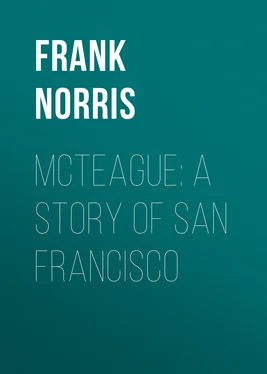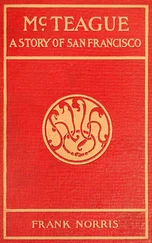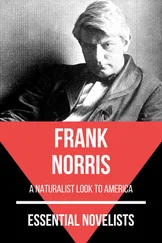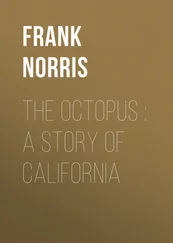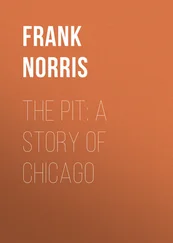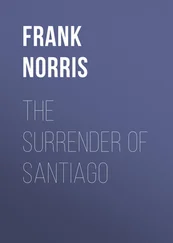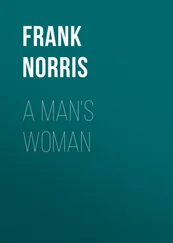Frank Norris - McTeague - A Story of San Francisco
Здесь есть возможность читать онлайн «Frank Norris - McTeague - A Story of San Francisco» — ознакомительный отрывок электронной книги совершенно бесплатно, а после прочтения отрывка купить полную версию. В некоторых случаях можно слушать аудио, скачать через торрент в формате fb2 и присутствует краткое содержание. Жанр: foreign_prose, literature_19, foreign_antique, на английском языке. Описание произведения, (предисловие) а так же отзывы посетителей доступны на портале библиотеки ЛибКат.
- Название:McTeague: A Story of San Francisco
- Автор:
- Жанр:
- Год:неизвестен
- ISBN:нет данных
- Рейтинг книги:3 / 5. Голосов: 1
-
Избранное:Добавить в избранное
- Отзывы:
-
Ваша оценка:
- 60
- 1
- 2
- 3
- 4
- 5
McTeague: A Story of San Francisco: краткое содержание, описание и аннотация
Предлагаем к чтению аннотацию, описание, краткое содержание или предисловие (зависит от того, что написал сам автор книги «McTeague: A Story of San Francisco»). Если вы не нашли необходимую информацию о книге — напишите в комментариях, мы постараемся отыскать её.
McTeague: A Story of San Francisco — читать онлайн ознакомительный отрывок
Ниже представлен текст книги, разбитый по страницам. Система сохранения места последней прочитанной страницы, позволяет с удобством читать онлайн бесплатно книгу «McTeague: A Story of San Francisco», без необходимости каждый раз заново искать на чём Вы остановились. Поставьте закладку, и сможете в любой момент перейти на страницу, на которой закончили чтение.
Интервал:
Закладка:
Between seven and eight the street breakfasted. Now and then a waiter from one of the cheap restaurants crossed from one sidewalk to the other, balancing on one palm a tray covered with a napkin. Everywhere was the smell of coffee and of frying steaks. A little later, following in the path of the day laborers, came the clerks and shop girls, dressed with a certain cheap smartness, always in a hurry, glancing apprehensively at the power-house clock. Their employers followed an hour or so later—on the cable cars for the most part whiskered gentlemen with huge stomachs, reading the morning papers with great gravity; bank cashiers and insurance clerks with flowers in their buttonholes.
At the same time the school children invaded the street, filling the air with a clamor of shrill voices, stopping at the stationers’ shops, or idling a moment in the doorways of the candy stores. For over half an hour they held possession of the sidewalks, then suddenly disappeared, leaving behind one or two stragglers who hurried along with great strides of their little thin legs, very anxious and preoccupied.
Towards eleven o’clock the ladies from the great avenue a block above Polk Street made their appearance, promenading the sidewalks leisurely, deliberately. They were at their morning’s marketing. They were handsome women, beautifully dressed. They knew by name their butchers and grocers and vegetable men. From his window McTeague saw them in front of the stalls, gloved and veiled and daintily shod, the subservient provision men at their elbows, scribbling hastily in the order books. They all seemed to know one another, these grand ladies from the fashionable avenue. Meetings took place here and there; a conversation was begun; others arrived; groups were formed; little impromptu receptions were held before the chopping blocks of butchers’ stalls, or on the sidewalk, around boxes of berries and fruit.
From noon to evening the population of the street was of a mixed character. The street was busiest at that time; a vast and prolonged murmur arose—the mingled shuffling of feet, the rattle of wheels, the heavy trundling of cable cars. At four o’clock the school children once more swarmed the sidewalks, again disappearing with surprising suddenness. At six the great homeward march commenced; the cars were crowded, the laborers thronged the sidewalks, the newsboys chanted the evening papers. Then all at once the street fell quiet; hardly a soul was in sight; the sidewalks were deserted. It was supper hour. Evening began; and one by one a multitude of lights, from the demoniac glare of the druggists’ windows to the dazzling blue whiteness of the electric globes, grew thick from street corner to street corner. Once more the street was crowded. Now there was no thought but for amusement. The cable cars were loaded with theatre-goers—men in high hats and young girls in furred opera cloaks. On the sidewalks were groups and couples—the plumbers’ apprentices, the girls of the ribbon counters, the little families that lived on the second stories over their shops, the dressmakers, the small doctors, the harness-makers—all the various inhabitants of the street were abroad, strolling idly from shop window to shop window, taking the air after the day’s work. Groups of girls collected on the corners, talking and laughing very loud, making remarks upon the young men that passed them. The tamale men appeared. A band of Salvationists began to sing before a saloon.
Then, little by little, Polk Street dropped back to solitude. Eleven o’clock struck from the power-house clock. Lights were extinguished. At one o’clock the cable stopped, leaving an abrupt silence in the air. All at once it seemed very still. The ugly noises were the occasional footfalls of a policeman and the persistent calling of ducks and geese in the closed market. The street was asleep.
Day after day, McTeague saw the same panorama unroll itself. The bay window of his “Dental Parlors” was for him a point of vantage from which he watched the world go past.
On Sundays, however, all was changed. As he stood in the bay window, after finishing his beer, wiping his lips, and looking out into the street, McTeague was conscious of the difference. Nearly all the stores were closed. No wagons passed. A few people hurried up and down the sidewalks, dressed in cheap Sunday finery. A cable car went by; on the outside seats were a party of returning picnickers. The mother, the father, a young man, and a young girl, and three children. The two older people held empty lunch baskets in their laps, while the bands of the children’s hats were stuck full of oak leaves. The girl carried a huge bunch of wilting poppies and wild flowers.
As the car approached McTeague’s window the young man got up and swung himself off the platform, waving goodby to the party. Suddenly McTeague recognized him.
“There’s Marcus Schouler,” he muttered behind his mustache.
Marcus Schouler was the dentist’s one intimate friend. The acquaintance had begun at the car conductors’ coffee-joint, where the two occupied the same table and met at every meal. Then they made the discovery that they both lived in the same flat, Marcus occupying a room on the floor above McTeague. On different occasions McTeague had treated Marcus for an ulcerated tooth and had refused to accept payment. Soon it came to be an understood thing between them. They were “pals.”
McTeague, listening, heard Marcus go up-stairs to his room above. In a few minutes his door opened again. McTeague knew that he had come out into the hall and was leaning over the banisters.
“Oh, Mac!” he called. McTeague came to his door.
“Hullo! ‘sthat you, Mark?”
“Sure,” answered Marcus. “Come on up.”
“You come on down.”
“No, come on up.”
“Oh, you come on down.”
“Oh, you lazy duck!” retorted Marcus, coming down the stairs.
“Been out to the Cliff House on a picnic,” he explained as he sat down on the bed-lounge, “with my uncle and his people—the Sieppes, you know. By damn! it was hot,” he suddenly vociferated. “Just look at that! Just look at that!” he cried, dragging at his limp collar. “That’s the third one since morning; it is—it is, for a fact—and you got your stove going.” He began to tell about the picnic, talking very loud and fast, gesturing furiously, very excited over trivial details. Marcus could not talk without getting excited.
“You ought t’have seen, y’ought t’have seen. I tell you, it was outa sight. It was; it was, for a fact.”
“Yes, yes,” answered McTeague, bewildered, trying to follow. “Yes, that’s so.”
In recounting a certain dispute with an awkward bicyclist, in which it appeared he had become involved, Marcus quivered with rage. “‘Say that again,’ says I to um. ‘Just say that once more, and’”—here a rolling explosion of oaths—“‘you’ll go back to the city in the Morgue wagon. Ain’t I got a right to cross a street even, I’d like to know, without being run down—what?’ I say it’s outrageous. I’d a knifed him in another minute. It was an outrage. I say it was an OUTRAGE.”
“Sure it was,” McTeague hastened to reply. “Sure, sure.”
“Oh, and we had an accident,” shouted the other, suddenly off on another tack. “It was awful. Trina was in the swing there—that’s my cousin Trina, you know who I mean—and she fell out. By damn! I thought she’d killed herself; struck her face on a rock and knocked out a front tooth. It’s a wonder she didn’t kill herself. It IS a wonder; it is, for a fact. Ain’t it, now? Huh? Ain’t it? Y’ought t’have seen.”
McTeague had a vague idea that Marcus Schouler was stuck on his cousin Trina. They “kept company” a good deal; Marcus took dinner with the Sieppes every Saturday evening at their home at B Street station, across the bay, and Sunday afternoons he and the family usually made little excursions into the suburbs. McTeague began to wonder dimly how it was that on this occasion Marcus had not gone home with his cousin. As sometimes happens, Marcus furnished the explanation upon the instant.
Читать дальшеИнтервал:
Закладка:
Похожие книги на «McTeague: A Story of San Francisco»
Представляем Вашему вниманию похожие книги на «McTeague: A Story of San Francisco» списком для выбора. Мы отобрали схожую по названию и смыслу литературу в надежде предоставить читателям больше вариантов отыскать новые, интересные, ещё непрочитанные произведения.
Обсуждение, отзывы о книге «McTeague: A Story of San Francisco» и просто собственные мнения читателей. Оставьте ваши комментарии, напишите, что Вы думаете о произведении, его смысле или главных героях. Укажите что конкретно понравилось, а что нет, и почему Вы так считаете.
